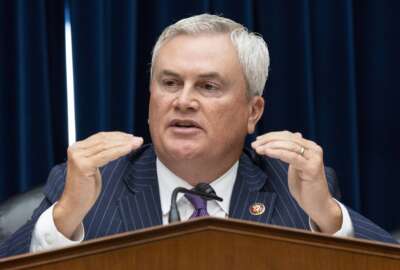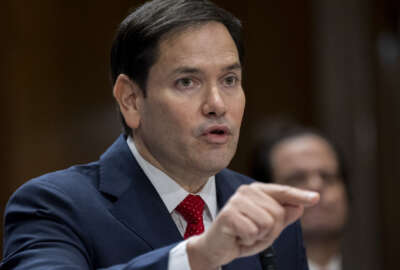Government shutdown averted, but what’s next for fiscal 2025
"They passed the CR, giving themselves until Dec. 20 to figure out what to do," Loren Duggan said.
We’ve seen this movie before, but in the span of just a couple days last week, we went from a lot of lingering uncertainty about whether the government would be funded beyond today to a continuing resolution being a fait accompli. Nobody likes CRs, but it’s a heck of a lot better than a shutdown. The government is now funded through Dec. 20. Here to talk more on the Federal Drive with Tom Temin about what happened and what is next for fiscal 2025 funding is Loren Duggan, the deputy news director at Bloomberg Government.
Learn more about your ad choices. Visit podcastchoices.com/adchoices
Interview transcript:
Jared Serbu And Loren, let’s start with what happened with actually funding the government last week. It was a little anti-climactic as it came together all at once. You want to take us through the process that eventually finally led up to this this last minute CR?
Loren Duggan Sure. In a span of a few days, we went from are they going to fund the government, to it looks like they are. And then they obviously got it done within three days the session and out of town with members hoping to get back to their states and districts in part to campaign, but also vowing to the reality of a storm heading toward the Gulf Coast. So they passed the CR, giving themselves until Dec. 20 to figure out what to do. It’s important to note they’re going to be gone for a big chunk of that time to campaign and do what they need to do to get reelected in November. But the CR was signed into law by the president on Thursday. Government will be funded in the beginning of the new fiscal year. And that little bit of question mark hanging over everyone’s head has been resolved for now.
Jared Serbu Yeah, and I’m guessing that Dec. 20 date is really not an accident. It gives everyone time to absorb the election results, and figure out which direction politically the country is going. Is that kind of the marker that we’re looking to next to figure out which direction appropriations might go?
Loren Duggan Definitely. I think Nov. 5 is the election. They’re supposed to come back Nov. 12, a week later. They’ll be digesting the results, maybe even meeting some of their new colleagues who could begin coming in for orientation. But the real question is going to be what’s the mix of the White House, the Senate and the House as far as they know it by then? Because if things are very narrow, there might still be open questions there. But what they do between that point and the end of the year to either fund the government, resolve those questions or perhaps leave it open to the new administration and the next Congress will remain to be seen. But that gives them some time to figure that out and get the work done, if that’s the direction they go or maybe even wrap up earlier and pass something into the new year, if that’s the direction they go. But the election will have a lot to do with the solution they choose there.
Jared Serbu Yeah. And is it your sense that the partisan makeup of the White House and Congress is going to determine just sort of funding priorities in a final appropriations bill, or might it even determine whether or not we have a full year CR versus appropriations at all?
Loren Duggan I think a little bit of both. There’s been talk among Republicans like Susan Collins (R-Maine.), who’s the ranking member of the Senate Appropriations Committee, she wanted to leave a clean slate to the next administration, regardless of who it was. Because either way, we’re going to have a President Harris or President Trump, we’re not going to have President Biden. And even President Harris would bring some changes with her to the personnel and the priorities. So it would be easier for a new president to have their input with this resolved. But if the parties think they’ll get a better deal waiting till next year, they might wait. And there could be hardline conservatives in the House who will say a President Trump, if he indeed wins, would be a better negotiator or get a better outcome. So why not leave it until next year, which that was their initial position. They wanted a six month CR going into the new administration, into the new year. So I think that’s where the election results and the makeup of the administration and Congress next year are going to factor in here.
Jared Serbu Regardless of what happens, we’re going to have the current Congress and the current president negotiating over what happens next after Dec. 20. And I guess, if anything, maybe this last week’s action gives us some hope that nobody really has an appetite to take us into shutdown territory. Is that is that fairly going to be the case still in December or is that going too far?
Loren Duggan I think we’ll see. But you’re right. Like the dance that they were doing three weeks ago when they were first coming into September was, let’s have a fight, let’s go for six months. Let’s push for this language about requiring proof of citizenship to vote. And all those things fell away as it became clear that there wasn’t the ability to get that through. There was a bipartisan vote with every Democrat that voted was for it, and a huge percentage of Republicans in both the House and the Senate with some dissent in both chambers. But that was correct. They didn’t want to have the shutdown, they wanted to get over the line, get back on the campaign trail, and then leave the fight for December. We’ll see if there’s that same energy there. But Dec. 20 is right before the holidays. A shutdown going into then could be painful, but people will remember a few years ago that is what happened where we had an end of the year shutdown going into a new Congress. So we’ll have to see how those dynamics play out at the end of the year.
Jared Serbu Yeah, totally fair point. All right. Beyond this sort of cliffhanger about whether the government gets funded next time or not, what are the other big ticket items that are going to be on Congress’ plate when they do come back after the election?
Loren Duggan Well, perennial bill is the National Defense Authorization Act that sets policy for the Pentagon and for defense programs at the Energy Department. That bill has gotten through the House on a partisan basis, excuse me. And the Senate has never taken up its bill, though behind the scenes, the managers of that of the Armed Services Committee have come up with a package they can take into negotiations. I would think that’s a bill they’ll work very diligently to try and get done once they’re back. It’s a very important legislation passed for like six decades in a row. No one wants to break that streak. So we’ll see what they can do to get a final version of that over the line in November or December. Also hanging over their head is the farm bill. This is something that committees have worked on but hasn’t hit the House or Senate floor. But the four corners, as they’re called, the leaders of the House and Senate panels have been trying to meet and are working towards some sort of resolution there. They’d like to get it done. A key factor there is Senate Agriculture Chairwoman Debbie Stabenow (D-Mich.) is retiring. So this is like her swan song. We’ll see if that helps get that done. And then there could be other bills sitting out there that chairman who are either retiring or maybe somebody loses their election or they see that the chamber is going to flip, that they’ll try and get over the line in the last few weeks, there is kind of their signature last piece of legislation. So a lot is out there to do, and we’ll see what they turn to when they return.
Copyright © 2025 Federal News Network. All rights reserved. This website is not intended for users located within the European Economic Area.
Jared Serbu is deputy editor of Federal News Network and reports on the Defense Department’s contracting, legislative, workforce and IT issues.
Follow @jserbuWFED






